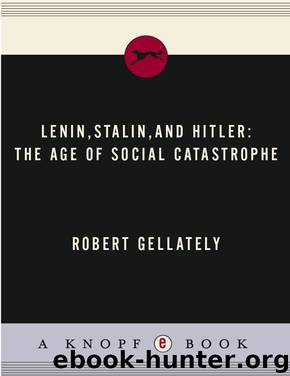Lenin, Stalin, and Hitler by Robert Gellately

Author:Robert Gellately [Gellately, Robert]
Language: eng
Format: epub
ISBN: 978-0-307-53712-6
Publisher: Knopf Doubleday Publishing Group
Published: 2007-11-19T16:00:00+00:00
HITLER’S ANSWER TO THE COMMUNIST CHALLENGE
Hitler’s worldview was worked out in opposition to the Communism he saw stalking the streets in Germany after the First World War. He also developed plans that were much more than idle daydreams. When he spoke to German army officers about his vision of the future, they were impressed and for the most part also convinced. The assertion that Hitler’s plans were little more than “objectless” fantasies is no more convincing than the claim that he “notoriously” exhibited “inner insecurity in all fundamental questions” and should be labeled a “weak dictator.”10One of Germany’s leading military historians takes Hitler’s ideas on foreign policy and his “program” far more seriously. “It is a mistake,” Manfred Messerschmidt writes, “for anyone to suppose that these ideas of Hitler’s were not more than simple reflections of a purely abstract nature. That is to miss the direction of his thought. We should not overlook its affinity with the ‘philosophy of war’ that became widespread after 1918. Hitler’s ideology and foreign policy objectives, as his later statements show, combined to form a thoroughly effective basis of political action.”11 Hitler had no difficulty in explaining his position to leading officers when he met with them only days after his appointment as chancellor.
To say that he had a “theory” or “philosophy” is not to claim that he planned everything in advance. He also made tactical compromises, and at crucial points in the war he even broke some key principles.
The idea of struggle was integral to Hitler’s thinking, particularly in foreign policy. He said in a speech at Erlangen in 1930, “Every form of life seeks to expand, and every people strives for world domination.”12The “stage plan” to world conquest he put forward in his writing before he came to power postulated that the first step for a new Germany was to reassert itself in foreign affairs and regain its rightful place as the dominant power on the continent. The initial period would be the most dangerous because the country would be vulnerable. But Hitler would never be content merely to tear up the Treaty of Versailles, put France in its place, and return Germany to what it was in 1914. In his view, the nation would have to prepare for war with the Soviet Union, but, so his thinking ran, it would do so with Britain’s support or at least with its neutrality.
Purges in the Soviet Union in the 1930s helped to reinforce Hitler’s determination, because the Red Army—most people in the West agreed—was so depleted that victory would come easily. Hitler believed that Germany would gain continental hegemony and lebensraum (living space) in the east. With that platform, Germany could then expand on a global scale and acquire a navy and colonies.13
Hitler thought it would be possible in his own lifetime to make Germany one of the “big four” powers in the world, alongside Britain, Japan, and the United States. He said little about America, but it was virtually inevitable that after wars
Download
Lenin, Stalin, and Hitler by Robert Gellately.epub
This site does not store any files on its server. We only index and link to content provided by other sites. Please contact the content providers to delete copyright contents if any and email us, we'll remove relevant links or contents immediately.
| Anarchism | Communism & Socialism |
| Conservatism & Liberalism | Democracy |
| Fascism | Libertarianism |
| Nationalism | Radicalism |
| Utopian |
The Secret History by Donna Tartt(19035)
The Social Justice Warrior Handbook by Lisa De Pasquale(12183)
Thirteen Reasons Why by Jay Asher(8885)
This Is How You Lose Her by Junot Diaz(6873)
Weapons of Math Destruction by Cathy O'Neil(6261)
Zero to One by Peter Thiel(5784)
Beartown by Fredrik Backman(5734)
The Myth of the Strong Leader by Archie Brown(5495)
The Fire Next Time by James Baldwin(5428)
How Democracies Die by Steven Levitsky & Daniel Ziblatt(5211)
Promise Me, Dad by Joe Biden(5141)
Stone's Rules by Roger Stone(5080)
A Higher Loyalty: Truth, Lies, and Leadership by James Comey(4947)
100 Deadly Skills by Clint Emerson(4917)
Rise and Kill First by Ronen Bergman(4776)
Secrecy World by Jake Bernstein(4739)
The David Icke Guide to the Global Conspiracy (and how to end it) by David Icke(4697)
The Farm by Tom Rob Smith(4501)
The Doomsday Machine by Daniel Ellsberg(4482)
